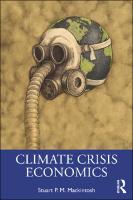Climate Crisis Economics
Proposal review
| dc.contributor.author | Mackintosh, Stuart P. M. | |
| dc.date.accessioned | 2022-02-21T09:36:27Z | |
| dc.date.available | 2022-02-21T09:36:27Z | |
| dc.date.issued | 2022 | |
| dc.identifier | ONIX_20220221_9781000441710_2 | |
| dc.identifier | ONIX_20220221_9781000441710_2 | |
| dc.identifier | OCN: 1264401204 | |
| dc.identifier.uri | https://library.oapen.org/handle/20.500.12657/53079 | |
| dc.description.abstract | Climate Crisis Economics draws on economics, political economy, scientific literature, and data to gauge the extent to which our various communities – political, economic, business – are making the essential leap to a new narrative and policy approach that will accelerate us towards the necessary transition to a decarbonized economy and sustainable future. The book draws out policies and practices with both national and local examples, which will demonstrate various complementary approaches that are empowering states and people as they seek to pursue the carbon neutral goal. The author delineates a climate crisis economics approach that is fit for purpose and which can help achieve necessary climate change goals in the decades ahead. Ensuring economic and ecological sustainability is neither easy nor cost-free; there is no single solution to the climate crisis. All aspects of our economies, policies, business, and personal practices must come into alignment in order to succeed. Frustratingly, we know what is needed and we have many of the technologies and systems to make the leap to a carbon neutral economy, yet we still fail to act with alacrity. Leaders, communities, and businesses must shift their narratives in how they talk about and think about the climate crisis. In doing so, in making the narrative leap to a new understanding about what is possible and necessary, we can stop endangering our common future and single, fragile, global habitat, and instead set the stage for Green Globalisation 2.0 and a new, sustainable industrial revolution. Climate Crisis Economics will appeal to academics, students, investors, and professionals from varying disciplines including politics, international political economy, and international economics. Written in an accessible voice, it draws on work in fields outside of and in addition to politics and economics to make a case for climate crisis economics as an approach to addressing the climate change challenge ahead. | |
| dc.language | English | |
| dc.subject.classification | thema EDItEUR::J Society and Social Sciences::JP Politics and government | en_US |
| dc.subject.other | carbon | |
| dc.subject.other | climate change | |
| dc.subject.other | climate crisis | |
| dc.subject.other | corporate sustainability | |
| dc.subject.other | decarbonisation | |
| dc.subject.other | decarbonization | |
| dc.subject.other | economics of climate change | |
| dc.subject.other | globalization | |
| dc.subject.other | governance | |
| dc.subject.other | IPE | |
| dc.subject.other | localization | |
| dc.subject.other | net zero | |
| dc.subject.other | sustainability | |
| dc.subject.other | sustainable business | |
| dc.title | Climate Crisis Economics | |
| dc.type | book | |
| oapen.identifier.doi | 10.4324/9781003037088 | |
| oapen.relation.isPublishedBy | 7b3c7b10-5b1e-40b3-860e-c6dd5197f0bb | |
| oapen.relation.isFundedBy | Knowledge Unlatched | |
| oapen.relation.isbn | 9780367478704 | |
| oapen.relation.isbn | 9780367478698 | |
| oapen.collection | Knowledge Unlatched (KU) | |
| oapen.imprint | Routledge | |
| oapen.pages | 304 | |
| oapen.grant.number | 7244 | |
| peerreview.anonymity | Single-anonymised | |
| peerreview.id | bc80075c-96cc-4740-a9f3-a234bc2598f1 | |
| peerreview.open.review | No | |
| peerreview.publish.responsibility | Publisher | |
| peerreview.review.stage | Pre-publication | |
| peerreview.review.type | Proposal | |
| peerreview.reviewer.type | Internal editor | |
| peerreview.reviewer.type | External peer reviewer | |
| peerreview.title | Proposal review | |
| oapen.review.comments | Taylor & Francis open access titles are reviewed as a minimum at proposal stage by at least two external peer reviewers and an internal editor (additional reviews may be sought and additional content reviewed as required). |

